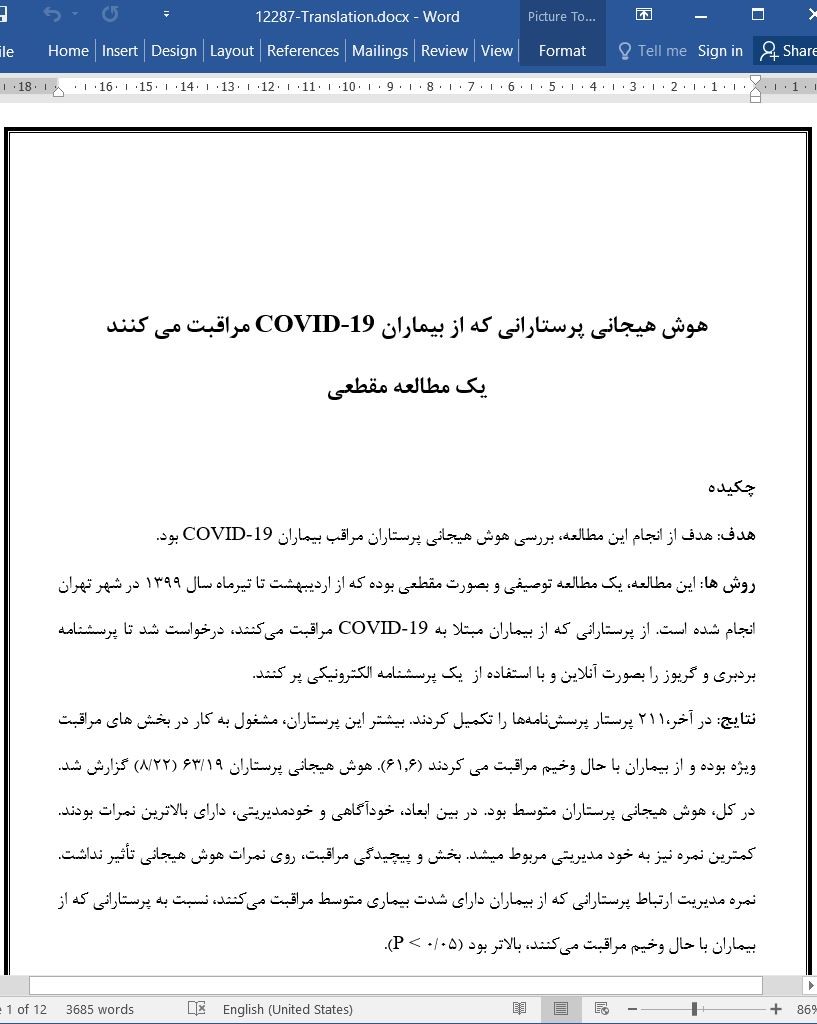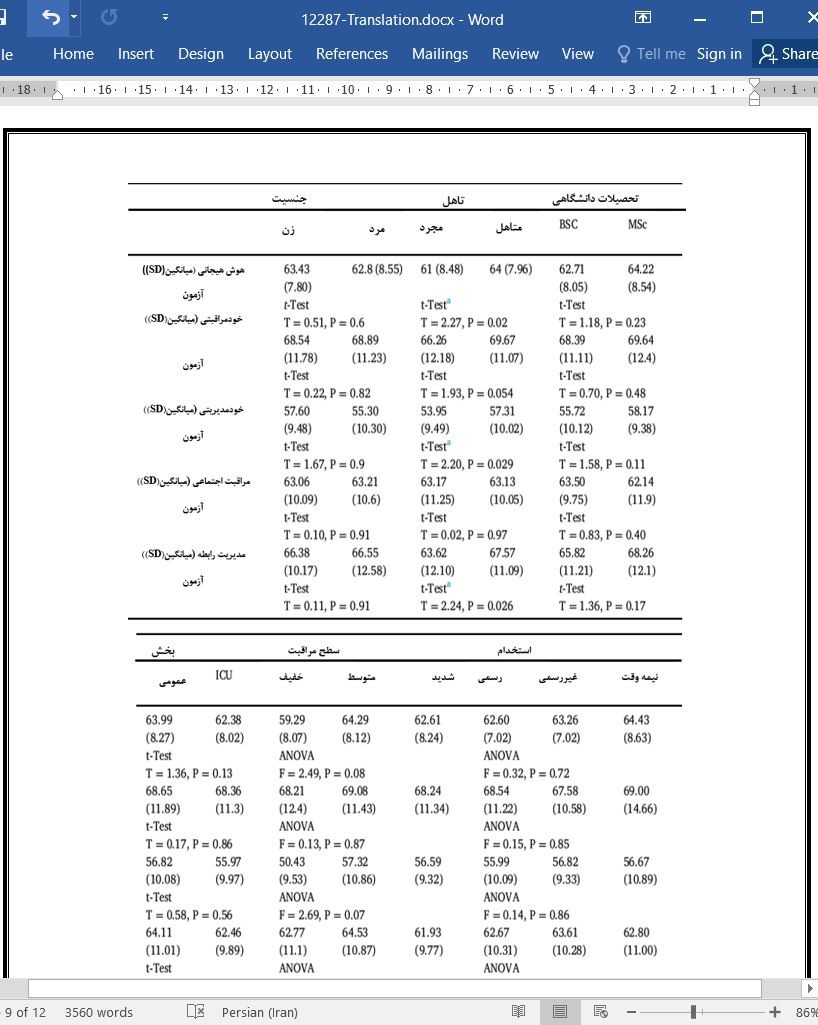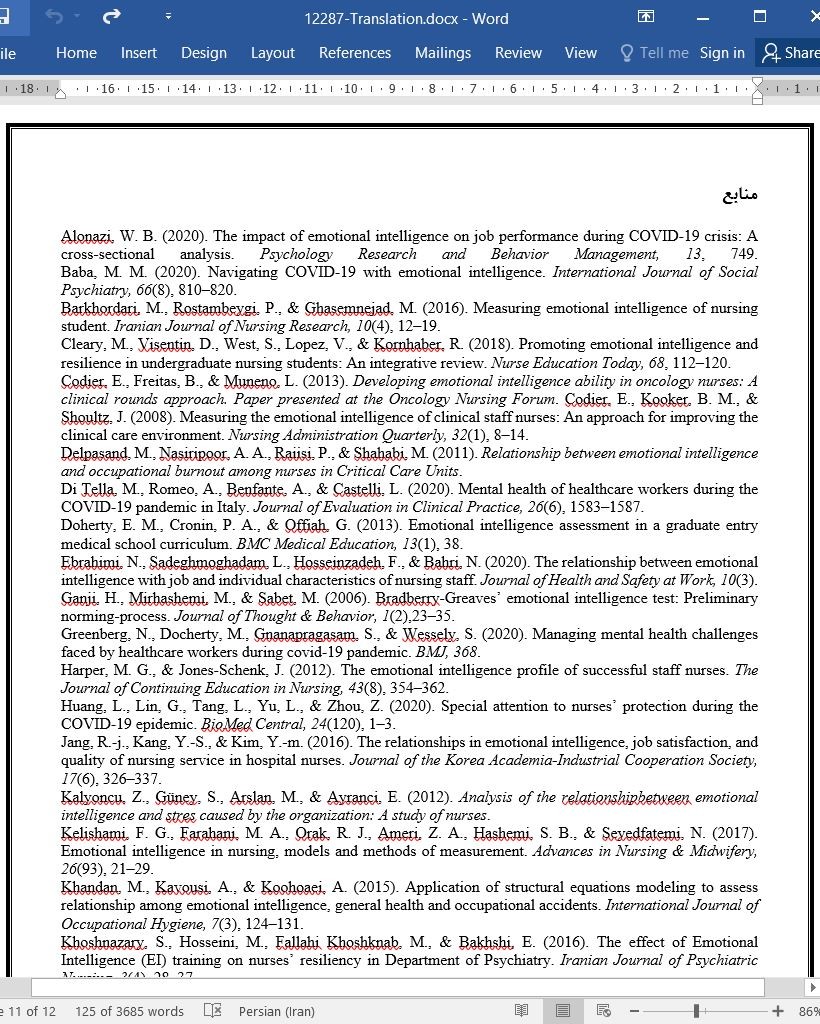
هوش هیجانی پرستارانی که از بیماران COVID-19 مراقبت می کنند
چکیده
هدف: هدف از انجام این مطالعه، بررسی هوش هیجانی پرستاران مراقب بیماران COVID-19 بود.
روش ها: این مطالعه، یک مطالعه توصیفی و بصورت مقطعی بوده که از اردیبهشت تا تیرماه سال 1399 در شهر تهران انجام شده است. از پرستارانی که از بیماران مبتلا به COVID-19 مراقبت میکنند، درخواست شد تا پرسشنامه بردبری و گریوز را بصورت آنلاین و با استفاده از یک پرسشنامه الکترونیکی پر کنند.
نتایج: در آخر،211 پرستار پرسشنامهها را تکمیل کردند. بیشتر این پرستاران، مشغول به کار در بخش های مراقبت ویژه بوده و از بیماران با حال وخیم مراقبت می کردند (61.6). هوش هیجانی پرستاران 19/63 (22/8) گزارش شد. در کل، هوش هیجانی پرستاران متوسط بود. در بین ابعاد، خودآگاهی و خودمدیریتی، دارای بالاترین نمرات بودند. کمترین نمره نیز به خود مدیریتی مربوط میشد. بخش و پیچیدگی مراقبت، روی نمرات هوش هیجانی تأثیر نداشت. نمره مدیریت ارتباط پرستارانی که از بیماران دارای شدت بیماری متوسط مراقبت میکنند، نسبت به پرستارانی که از بیماران با حال وخیم مراقبت میکنند، بالاتر بود (05/0 > P).
نتیجه گیری: هوش هیجانی، نمره کلی متوسطی داشت. از آنجا که همه گیری COVID-19 تداوم داشته و احتمال خستگی روحی و جسمی کارکنان بهداشتی و درمانی بالاست، ارتقای هوش هیجانی می تواند بر تاب آوری و ثبات وضعیت روانی کارکنان تاثیرگذار باشد.
نتیجه گیری
نمره EI در پرستارانی که از بیماران مبتلا به COVID-19 مراقبت می کردند متوسط بود. بیشترین نمره از نظر ابعادی، به توانایی های فردی (خودآگاهی و خود مدیریتی) مربوط بود. مطابق با نتایج پژوهش حاضر، طبق ویژگی های پرستاران در شناخت و مدیریت هیجانات خود، رشد هوش هیجانی دارای اهمیت بسیاری است. به دلیل ادامه داشتن این بیماری همه گیر و احتمال فرسودگی روحی و جسمی در کارکنان بهداشتی و درمانی، ارتقاء هوش هیجانی می تواند بر تاب آوری و ثبات وضعیت روانی کارکنان تاثیر داشته باشد.
Abstract
Purpose The aim of this study was to assess the emotional intelligence of nurses caring for COVID-19 patients.
Methods This was a descriptive cross-sectional study that was conducted from May to July 2020 in Tehran, Iran. Nurses caring for patients with COVID-19 were requested to fill in Bradbury and Graves's questionnaire online using a questionnaire in electronic format.
Results Finally 211 nurses completed the questionnaires. Most of the nurses were working in critical care wards and caring for critical patients (61.6). Nurses' emotional intelligence was reported to be 63.19 (8.22). In general, the nurses' emotional intelligence was moderate. Between the dimensions, self-awareness and self-management had the highest scores. Also, the lowest score was related to self-management. The ward type and complexity of care had no effect on the scores of emotional intelligence. Nurses caring for patients with moderate disease severity had a higher relationship management score than nurses caring for critically ill patients (P < 0.05).
Conclusion The total score of emotional intelligence was moderate. Due to the continuation of the COVID-19 pandemic and the possibility of mental and physical fatigue of health care workers, improving emotional intelligence can be effective in resilience and stability of the psychological status of employees.
Conclusion
The EI of nurses caring for patients with COVID19 was moderate. In terms of dimensions, the highest score was related to individual abilities (self-awareness and self-management). According to the results of the present study, the development of emotional intelligence based on the characteristics of nurses is very important in recognizing and managing their emotions. Due to the continuation of this pandemic and the possibility of mental and physical fatigue of health care workers, improving emotional intelligence can be effective in resilience and stability of the psychological status of employees.
چکیده
مقدمه
روش ها
هدف
نمونه
جمع آوری داده
ملاحظات اخلاقی
تحلیل آماری
نتایج
بحث
محدودیت ها
نتیجه گیری
اعلامیه منافع رقابتی
تشکر و قدردانی
منابع
Abstract
Introduction
Methods
Aim
Sample
Data collection
Ethical consideration
Statistical analysis
Results
Discussion
Limitations
Conclusion
Declaration of competing interest
Acknowledgment
References
- اصل مقاله انگلیسی با فرمت ورد (word) با قابلیت ویرایش
- ترجمه فارسی مقاله با فرمت ورد (word) با قابلیت ویرایش، بدون آرم سایت ای ترجمه
- ترجمه فارسی مقاله با فرمت pdf، بدون آرم سایت ای ترجمه



